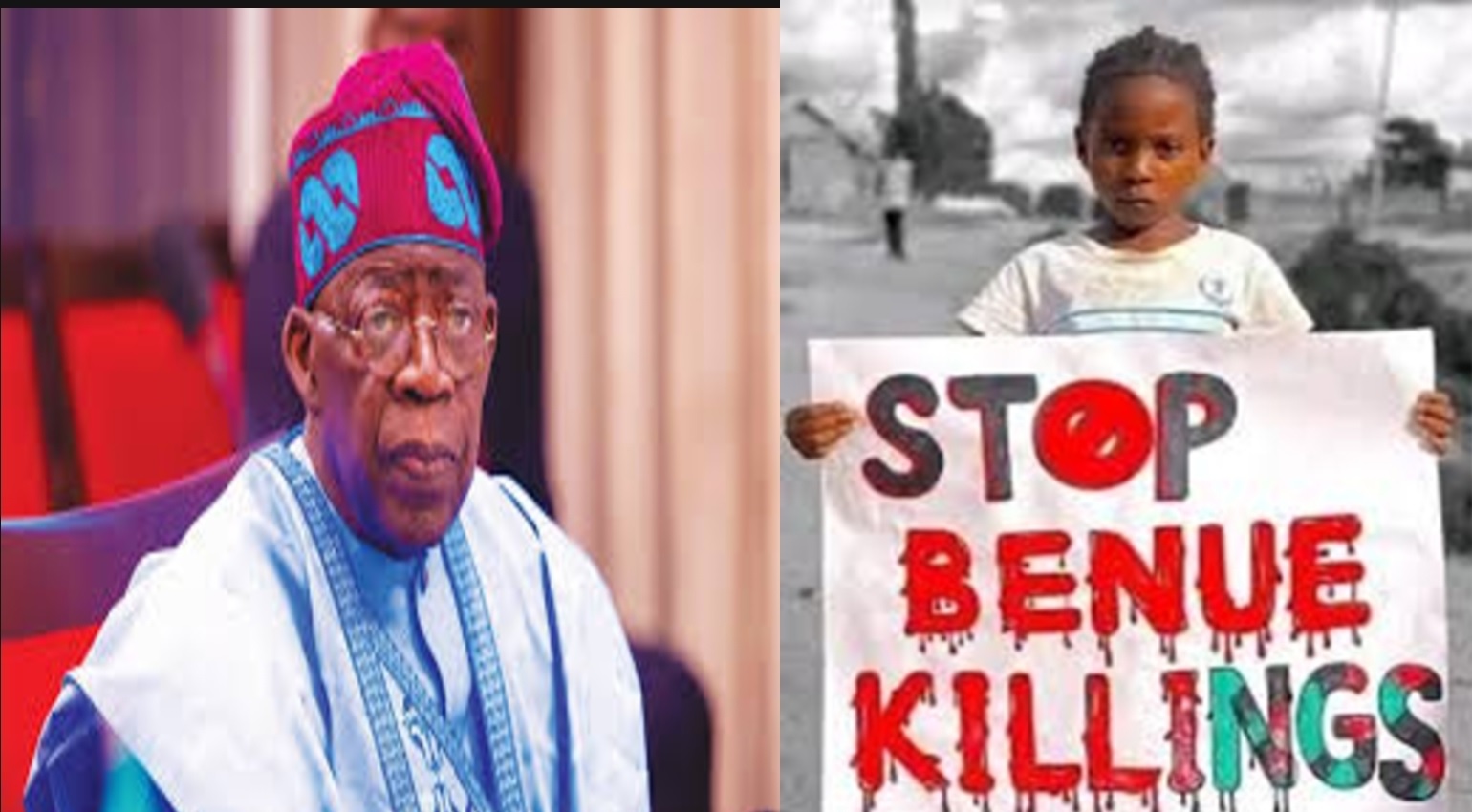President Tinubu traveled to Makurdi, Benue State, on June 18, 2025, in response to a devastating attack in the Yelewata community over the previous weekend, but the people of Benue and a great number of Nigerians have seen the President’s delayed visit as heartbreaking.
The People of Benue State in particular ‘have said that his delayed visit hurt more than the bullets’.
Reasons President Tinubu travelled to Benue
Condolences and Calm
A brutal assault, likely by herdsmen, left at least 100–150 people dead and homes burned during a nighttime raid, forcing villagers to flee into a market for safety
Tinubu’s visit was aimed at offering condolences, stabilizing a volatile situation, and sending a reassuring message that the federal government was taking the incident seriously.
Show of Accountability
He toured a hospital in Makurdi to meet injured survivors, met with local officials, and confronted security chiefs—asking pointedly, “How come no arrest has been made?”
The move underscored his emphasis on accountability and urgency in bringing perpetrators to justice.
Security and Justice Directives
Tinubu used the visit to instruct security forces to identify, arrest, and prosecute those responsible for the attack.
He also launched a broader promise of a crackdown to prevent a recurrence of such bloodshed
Why It Matters
It demonstrates federal government presence and responsiveness to increasing herder–farmer conflict in Nigeria’s Middle Belt.
Also, it addresses mounting criticism over what many saw as a delayed or muted response following the tragic events
The visit supposedly aims to restore calm, reassure local and national stakeholders, and reinforce the government’s commitment to tackling insecurity.
In short: Tinubu’s trip was a crisis response, a mix of empathy, accountability, and authority, directed at quelling further violence, supporting victims personally, and demanding swift action from security forces.
Backlash from Nigerians on President Tinubu’s delayed visit
Nigerians criticized President Tinubu’s delayed visit to Benue State for several key reasons, mostly rooted in perceived insensitivity, poor crisis management, and lack of urgency:
Delayed Response to a Massacre
The attack in Yelewata, Benue State, occurred over the weekend (around June 14–15, 2025), with 100–150 people reportedly killed.
Tinubu didn’t visit until June 18, sparking frustration that it took three to four days before he made a personal appearance in a state facing one of the deadliest attacks this year.
“When your people are being slaughtered and all you get is silence from the top, it sends a message.” — local activist on social media
Comparisons to Other Tragedies
Many Nigerians drew parallels between Tinubu’s handling of the Benue massacre and how swiftly leaders in other countries respond to national tragedies, suggesting that a faster response would have signaled greater compassion and leadership.
Lack of Immediate Federal Presence
Until Tinubu’s visit, the federal government’s presence in Benue was minimal, which worsened the feeling of abandonment among victims and survivors.
Critics argued that sending high-ranking officials or even a televised address earlier could have made a difference.
Political Undertones and Distrust
Tinubu’s perceived slowness rekindled longstanding accusations of federal neglect toward Middle Belt and rural communities that often bear the brunt of herder–farmer violence.
Some commentators viewed the delay as part of a broader pattern of political bias or lack of priority given to certain regions.
Media and Public Pressure
Civil society groups, clergy, and social media users quickly called out the delay.
Hashtags like #BenueMassacre and #WhereIsTinubu trended for days, further intensifying public pressure on the presidency.
In Summary, Tinubu was criticized not just for being late, but for what the delay symbolized: a government slow to act in the face of overwhelming human tragedy. The criticism reflected wider frustrations with governance, security, and accountability in Nigeria.
Impact of the President’s delayed visit
The impact of President Tinubu’s delayed visit to Benue State after the Yelewata massacre was both political and psychological.
It affected victims, public opinion, and the perception of federal leadership. Here’s a breakdown of the main consequences:
Erosion of Public Trust in Leadership
Benue residents and Nigerians across the country saw the delay as a sign of indifference to the lives lost.
Survivors and local leaders expressed disappointment that the president did not show immediate concern, especially given the scale of the attack.
“We buried over 100 people before the president remembered us. That silence hurt more than the bullets.” — Local elder
Widespread Criticism and Political Backlash
Tinubu’s delay was heavily criticized by opposition politicians, activists, and civil society groups.
It added fuel to long-standing grievances about federal neglect of Nigeria’s Middle Belt, where communities frequently suffer from herder–farmer violence.
His administration was accused of being reactive rather than proactive in handling insecurity.
Psychological Impact on Victims and Survivors
The delayed visit amplified the trauma and feeling of abandonment among survivors.
Many in Benue felt the president’s late arrival was a form of emotional disconnection, worsening grief and hopelessness.
Media and Social Media Fallout
The president’s slow response became a trending topic, with hashtags like #BenueMassacre and #DelayedLeadership used to criticize the government’s inaction.
News coverage and viral posts intensified national pressure, forcing a defensive posture from the presidency.
Damage to Credibility on Security Promises
Tinubu came into office promising to tackle insecurity decisively.
The delay undermined that narrative, casting doubt on the administration’s preparedness and seriousness in responding to national emergencies.
Forced Policy Shift and Public Accountability
The backlash may have pressured Tinubu to respond more quickly and visibly to future crises.
During the visit, he gave firm orders for arrests and prosecutions, signaling a need to reclaim control and public confidence.
In Summary, Tinubu’s delayed visit to Benue State weakened trust, deepened national criticism, and highlighted the need for faster, more empathetic crisis leadership.
The political and emotional damage from the delay may have lasting effects—both on his credibility and on how future federal responses to insecurity are judged.







